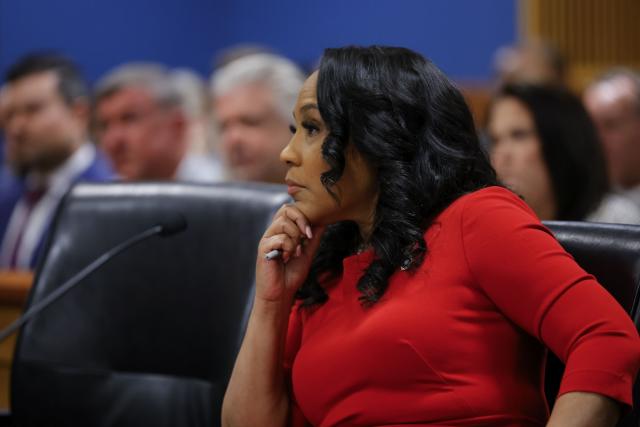Senate GOP Criticizes Proposed ESG Disclosure Rule For Contractors
Senate Republicans, under the leadership of Sen. Eric Schmitt, have voiced their opposition to a proposed rule by the Biden administration focused on environment, social, and governance (ESG) criteria for government contractors.
The legislators argue that this requirement could potentially disrupt key operations within the Department of Defense (DOD), General Services Administration (GSA), and NASA, as Breitbart reports.
The contentious rule, mandating the disclosure of greenhouse gas emissions among other climate-related data, has sparked a significant debate on its implications for national defense and space exploration.
The proposed regulation, known as the Federal Supplier Climate Risks and Resilience Rule or the Contractor Climate Rule, would mandate that contractors disclose their greenhouse gas emissions, climate-related financial risks, and set targets for emissions reduction.
This move is part of a broader initiative by the Biden administration to integrate climate considerations into federal procurement policies. Senators such as John Thune, Dan Sullivan, and others have joined Schmitt in expressing their concerns, emphasizing the potential distraction and negative impact the rule could have on securing the nation and exploring outer space.
One of the major points of contention is the belief that the rule might divert attention from critical missions, including defense strategies and space exploration efforts such as the Artemis mission. The senators have questioned whether the DOD and NASA have conducted sufficient analysis on the potential impacts of the rule on these essential functions.
The widespread concern has led the group to consider legislative measures, such as invoking the Congressional Review Act (CRA), to overturn the rule should the administration choose to proceed with its implementation.
Senators Threaten Legislative Action Against ESG Rule
In recent communications, the Senate Republicans have not minced words, labeling the Contractor Climate Rule as potentially disastrous. They argue that it would significantly distract from the core objectives of defense and space agencies by injecting bureaucratic hurdles into their operations.
This critique is part of a broader dispute over federal procurement policies, drawing parallels with previous conflicts such as the legal challenges to COVID-19 vaccine mandates for federal contractors.
The Republicans’ critique extends beyond the practical implications of the rule, suggesting that it represents another effort by the Biden administration to enact significant societal changes through procurement policies. By mandating climate disclosures, the administration is accused of pursuing a radical environmental justice agenda, one that the Senators believe could detrimentally affect the defense and space industrial bases.
They have issued a stark warning: if the proposed rule moves forward, Congress will be compelled to introduce a resolution of disapproval under the CRA and explore other legislative avenues to prevent its implementation.
The widespread opposition among Senate Republicans to the Contractor Climate Rule highlights a significant ideological divide over how the federal government should balance environmental accountability with operational efficiency.
The group's vocal criticism and threats of legislative action signify a brewing conflict that could see significant political and legal battles over federal procurement policies. Their stance is clear: procurement objectives should prioritize acquiring high-quality goods efficiently without being mired in what they view as unnecessary regulations.
Analysis and Impact on Federal Procurement Policies
This latest controversy over the ESG rule for government contractors is not an isolated incident. It follows a pattern of disputes between the Biden administration and Senate Republicans over how federal procurement policies are employed. Previously, the administration's efforts to enforce COVID-19 vaccine mandates on federal contractors were met with legal challenges and widespread criticism, reflecting ongoing tensions over the use of procurement to effectuate broad policy goals.
The focus of the Senators' argument is that procurement policy should not be used as a tool to achieve what they describe as "radical environmental justice goals." By demanding that agencies like the DOD, GSA, and NASA prioritize emissions disclosure and climate resilience, the proposed rule is seen as detracting from their primary missions. This perspective underscores a fundamental disagreement over the role of climate change mitigation in national policy and the extent to which federal agencies should be involved in these efforts.
The debate over the Contractor Climate Rule also shines a light on the broader conversation about ESG factors in government contracting. While proponents argue that integrating climate considerations into procurement policies can drive innovation and set new global standards, critics worry about the potential for such policies to compromise the efficiency and effectiveness of critical government functions.
As the Biden administration continues to push for greater climate accountability, the resistance from Senate Republicans suggests that the implementation of these policies will be neither straightforward nor uncontested.
Conclusion: The Evolving Battle Over Climate Disclosures
In sum, the controversy surrounding the proposed Federal Supplier Climate Risks and Resilience Rule underscores the growing tensions between the Biden administration and Senate Republicans over environmental, social, and governance (ESG) criteria in government contracting.
Sen. Eric Schmitt and his colleagues have voiced strong opposition to the rule, fearing it could adversely affect vital operations within the DOD, GSA, and NASA. Their stance highlights a broader ideological divide over the role of environmental considerations in federal procurement and national policy.
As both sides prepare for a potential legislative showdown, the outcome of this dispute may have far-reaching implications for federal procurement policies and the government's approach to combating climate change.






